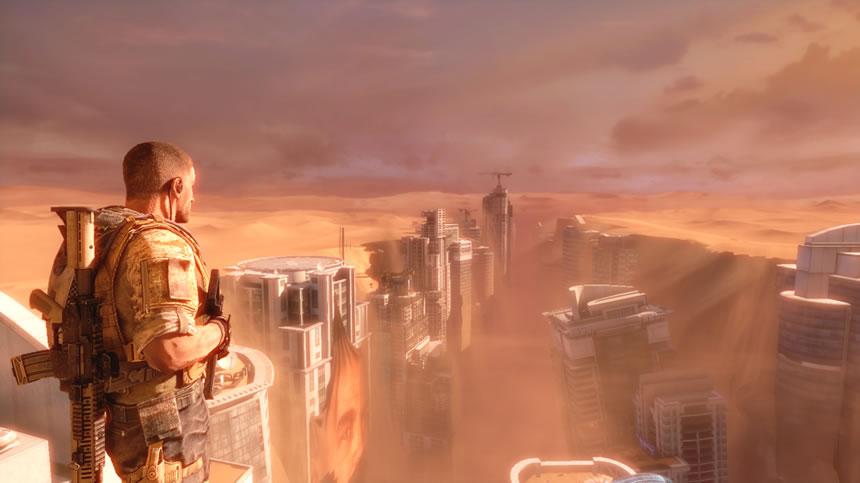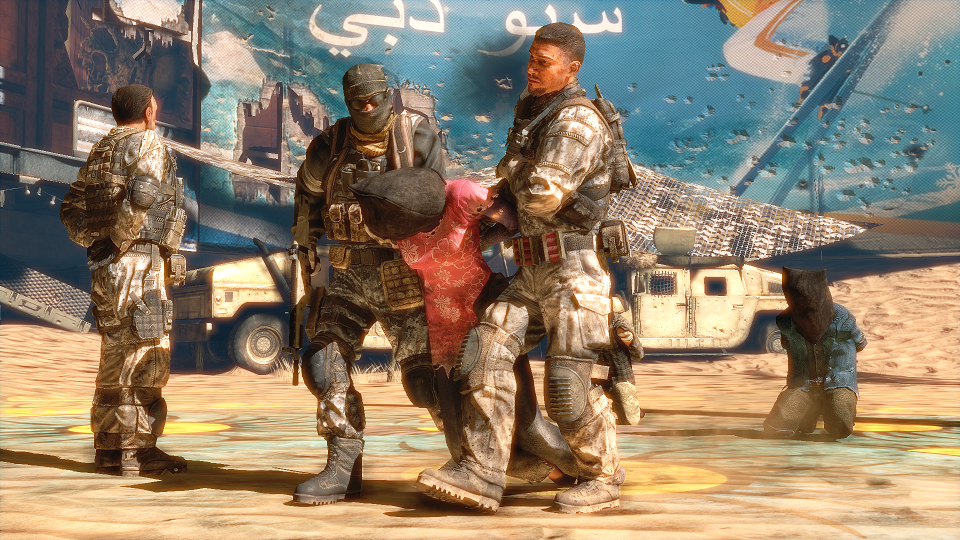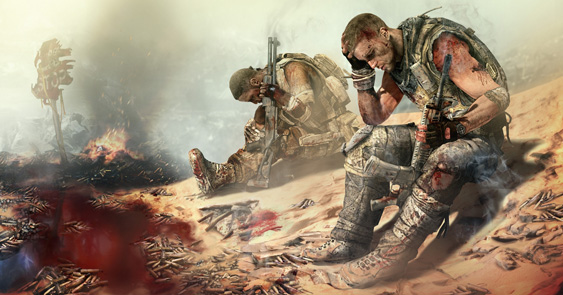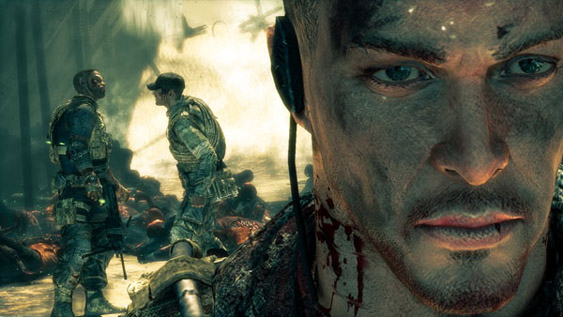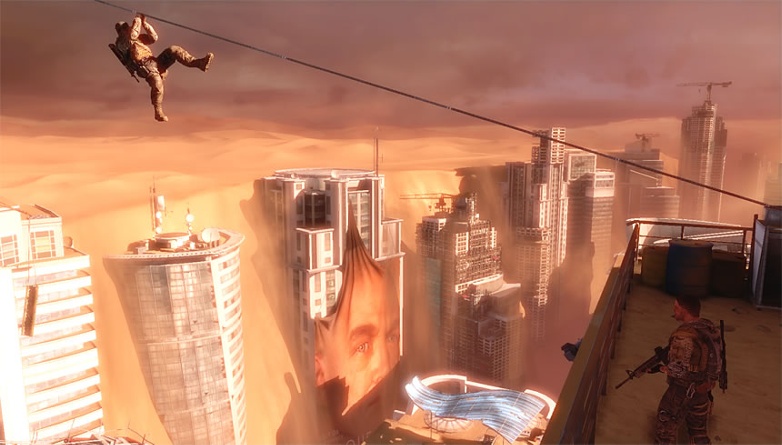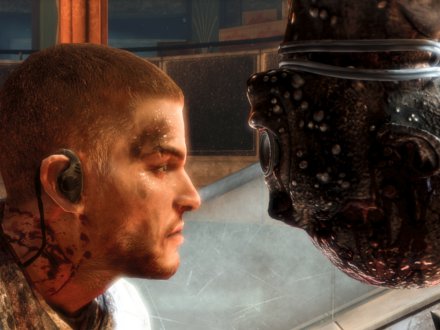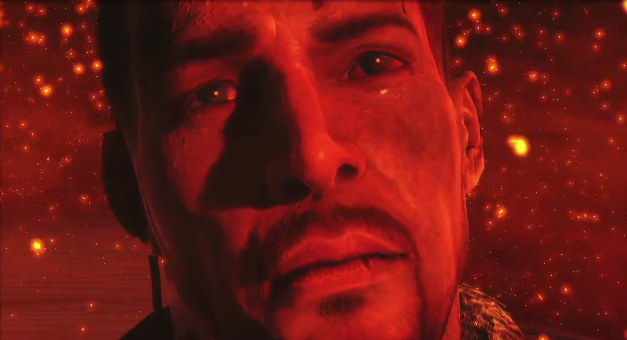BUY IT FROM AMAZON: RIGHT HERE!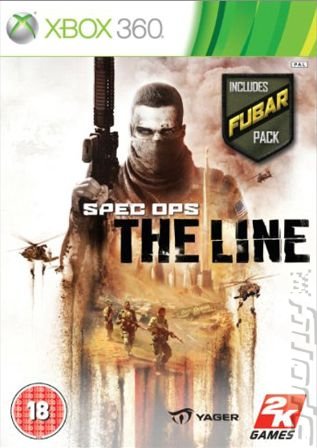
PLATFORM: 360, PS3, PC
PRICE: $59.99
ESRB RATING: M
DEVELOPER: Yager Development
PUBLISHER: 2K Games
I don’t know how Yager and 2K got away with it. I really don’t. In a season of spectacular games (Prototype 2, Max Payne 3, Botanicula, and so many others), they have created what is perhaps the most visceral and gut-wrenching game of this generation. While games this generation have been fun, charming, slow-mo bullet ballets or hack and slash adventures, none have been so emotionally engaging or powerful as Spec Ops: The Line.
Drawing influences from Apocalypse Now and Heart of Darkness, Spec Ops: The Line is wholly its own animal. While there are some obvious nods to those two brilliant pieces of film and literature, respectively, the narrative of the game goes places never seen before in gaming. How Yager and 2K got away with going to these places in the first place blows my mind. It’s like there’s something living in the game, a dark entity that draws you in and never wants to let you go. Not to sound too much like the game’s Radioman, but it gets under your skin, man, it takes you places that you never wanted to go.
THE PITCH
Set in Dubai after six months of pounding sandstorms, Colonel John Konrad and “The Damned” 33rd Battalion are sent into the city in order to evacuate and rescue civilians. After the rescue efforts fail, against orders of evacuation, Konrad volunteers his entire Battalion to remain in Dubai in order to maintain order and keep the city’s infrastructure from collapsing.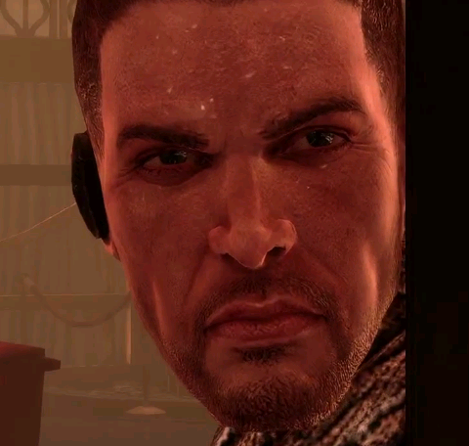 Satellite communication goes dark, and the US Military decides to send in a three-man recon squad (led by player-controlled character Captain Martin Walker) to uncover Konrad’s whereabouts and determine exactly what went wrong in Dubai.
Satellite communication goes dark, and the US Military decides to send in a three-man recon squad (led by player-controlled character Captain Martin Walker) to uncover Konrad’s whereabouts and determine exactly what went wrong in Dubai.
THE PLAY
The game, at first glance, appears to be your standard third-person shooter a la Gears of War or Mass Effect 3. You can issue commands to your squadmates, but overall, you aren’t bogged down with having to position them around the level. They seek cover, they find targets. Basically, they work well on their own, however; battlefield management is important once the firefights get frantic. Ammo is also pretty scarce, so measuring your shots is important.
The original Spec Ops games were similar, but The Line takes things in a more fluid and contextual direction. As mentioned, your squadmate AI is pretty swift. Lugo, your sniper/medic/engineer is a crack shot and can take down enemy snipers. Adams, your heavy-gunner and tracker provides solid cover-fire and lays enemies out with his SAW and combat shotgun.
Perhaps the most interesting aspect of the combat is the utilization of the environment to the player’s advantage. By shooting out gigantic windows in beautiful skyscrapers, one can bring down a wall of sand upon their enemies, effectively burying them and ending combat. Ceilings can be shot out, raining glass and sand on foes to disorient and maneuver around them.
Even on the easiest setting, enemies still pose a threat. They’re often just as smart as your AI squadmates, flanking you, tossing grenades behind your cover and making good use of cover. Couple that with lethally efficient enemy snipers, heavily-armored SAW gunners and knife-wielding nutjobs, and you’ve got a nice variety of enemies to go along with your standard foot soldiers.
THE PRESENTATION
Spec Ops: The Line is a visually-stunning achievement of this generation. There are a handful of settings for the visual aspect of the game, and the one I chose was “Vibrant”, which presented Dubai as a shiny oasis in the desert. There are other settings you can choose, but for what this game is, and for the nightmarish quality of the narrative, painting the game in a “Vibrant” swath made it all the more surreal for me.
The soundtrack, mostly utilizing classic rock like Deep Purple’s “Hush”, is pitch-perfect for the game. The actual score portions of the game are minimal, though when coupled with the psychedelic soundtrack, the Apocalypse Now connection really shines through. Hell, I’m listening to The Doors while I write this (I put off dropping acid for this particular review, I was all out after my Lego Batman one, j/k).
The HUD is kept to a minimum, which is nice, so there isn’t much clouding up the screen during gunfights. Your squadmates, at times, can be indistinguishable from other enemies on the field, but I feel this was intentional, as it adds to the concept of the narrative. This is Americans killing Americans in enemy-occupied territory.
In terms of voice acting, everyone is top-notch. Christopher Reid (aka Kid from Kid ‘N Play) voices Adams, Walker’s second in command. In the beginning, Adams is more of your run-of-the-mill second banana, but is given some amazing moments near the end of the game that will hopefully see us getting more voice acting from Reid in the future. His delivery and performance is fantastic. Obid Abtahi plays Lugo, who’s given a lot of the comic relief (what little there is). His character’s arc is quite powerful, so it’d be an injustice to Abtahi to spoil anything here.
Bruce Boxleitner plays John Konrad in a haggard and cryptic performance. His audio messages throughout the game’s narrative are often chilling, with his delivery seeming ethereal in nature. While he comes across as this distant voice chiding Walker and his team from across the city, the nature of his relationship with Walker adds a certain father-son quality to the story.
Jake Busey plays The Radioman, former Rolling Stone reporter embedded with “The Damned” 33rd. His performance is also top-notch here, with his particularly grizzled voice also being used in the multiplayer. The Radioman, akin to Dennis Hopper’s character in Apocalypse Now, is something of a psychopath, so obviously Busey had a lot of fun with the character, as most actors say crazies are always fun to play.
Let’s talk about Nolan North. Nathan Drake himself and probably the king of voice actors right now. The guy is in everything. He plays a 40-year old sounding Superboy on Young Justice. He’s a cockney Penguin in Arkham City. In Spec Ops: The Line, he plays Captain Walker, the hero of the tale. I’m going on record right now and saying that North has never been better. His acting is top-notch and his delivery is spot-on perfect for the various moments in the game. This is not a particularly easy game (nor a high-profile one, at that) to cast, but North really is on his A-game here.
Walker isn’t the squeaky-clean hero we’re accustomed to in gaming. Even Max Payne seemed guided by some sort of moral code throughout Max Payne 3, as fucked up as he was. Typically, the enemy in a shooter (Call of Duty or Battlefield or whatever) is meant to be somewhat dehumanized (ignoring the ethical complexities of multiplayer, of course), however; Spec Ops: The Line humanizes the enemy in every imaginable way.
The Grand Theft Auto games glamorize and satirize the concept of violence, neutering it to the point of making it near-meaningless. Spec Ops: The Line never does this, and its hero reflects on the ugliness of battle more and more as the story progresses. This is the heart of North’s performance, reflecting a true battle-hardened warrior pushed to the absolute edge of morality. Teetering on the edge of mania by the end of the game, Walker’s actions and dialogue reflect it.
THE REPLAY
Incredibly high. With the player forced to make various choices throughout the game’s narrative that have multiple payoffs, there’s plenty of reasons to go back and run through the game. I plan on doing it as soon as humanly possible, personally.
The multiplayer is a solid addition, with matches making use of the sandstorm mechanic found in the narrative. Matches are often slower-paced than your average shooter, but considering the size and locale of the game, it makes sense. Establishing a foothold and providing cover for teammates is an incredibly important aspect of the multiplayer. I’ve heard complaints that the multiplayer is somewhat laggy, but personally, I’ve not had any difficulty connecting to matches.
THE VERDICT
I have never seen a game so unflinchingly portray the horrors of war. The monumental atrocities perpetrated by combatants given a license to kill is something often avoided or reserved for films like Platoon, Full Metal Jacket or Apocalypse Now. Interesting that those are all Vietnam flicks. Have we gotten a serious look at the current war that goes to the places that those movies have gone? Maybe that was Yager’s intention, to comment on the current climate of war and middle-eastern opulence.
In Spec Ops: The Line, the atrocities of war and battle are at the heart of the game’s message, which plays almost like an anti-war mantra. Beautiful in execution yet thoughtful in ways no other game has ever been, the fact that this game exists amazes me. Horrific moments like Walker staring at the consequences of an unchecked white phosphorous attack on a group of “enemies” is a gaming moment I’ll never forget as long as I live.
Bucking the obvious “the horror … the horror” moment, Spec Ops: The Line internalizes the horror and presents it in narrative form. With Walker’s psychologically fragile state near the end of the game, the player gets a true sense of the horror. Video games don’t often pose the difficult questions and scenarios that Spec Ops: The Line does. There’s usually no right or wrong, just “do” (or “Follow”, as in the Call of Duty games). Morality, life, death and redemption are all key elements of Spec Ops: The Line, and all take on meanings that rival even a game like Mass Effect for moral choice.
I’ve never wished I could play through a game again with virgin eyes. Spec Ops: The Line is a testament to narrative brilliance with so many great moments to punctuate the exciting action sequences. The game is a beautiful nightmare that I don’t ever want to wake up from.
10 out of 10
